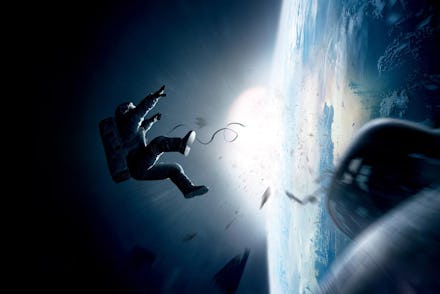Science Fiction Isn't Dead, It Just Isn't Fiction Anymore

Science fiction often conjures in us images of foreign worlds — far-off planets populated by robots and aliens, or ones like our own that have fallen into dystopia. Perhaps for its otherworldliness, it's a genre that we often relegate to niche status: sci-fi, in our minds, is for a small sect of nerdy enthusiasts. It is rarely ever seen as 'mainstream.'
Yet today, especially in film and TV, sci-fi seems to be more popular than ever, and this shouldn't be surprising: as we continue to make broader technological advances, the questions and concerns that mark the genre are becoming extremely relevant to our own reality. We're more interested in sci-fi because we're beginning to live in a sci-fi world.
In 2007, director Ridley Scott controversially proclaimed that sci-fi was dead. At the Venice Film Festival that year, the director who had produced such sci-fi classics as Blade Runner and Alien argued that the genre had become exhausted and unoriginal, beleaguered by weak plot lines and an over-reliance on special effects. Yet in the past few years, the outpouring of successful sci-fi films and adaptations — including one from Scott himself — proves that the genre is thriving. In fact, it's become the mainstream.
Consider recent films like Neill Blomkamp's District 9 (2009), or Alfonso Cuaron's Children of Men (2006). Though both films fall into special effects-laden, blockbuster territory, they also tackle more serious, complex subject material that have won them critical acclaim. Blomkamp's District 9 skillfully reverses our expectations of an alien invasion in an allegory for South African apartheid, while Cuaron's Children of Men, much like Margaret Atwood's The Handmaid's Tale, explores a world in which fertility has been extinguished. Other films, such as Source Code (2011) and Looper (2012) captivate us with their inventive explorations of technical possibilities: what if we could occupy someone's last minutes of consciousness, or travel through time? Films like Source Code and The Matrix, are a whole new subset of sci-fi films inspired by internet technologies.
These films combine the best of sci-fi and Hollywood to huge success: special effects and high budgets can be put towards rendering sci-fi's inventive worlds in captivating detail. Then, these worlds become both entertaining and instructive for an increasingly technology-oriented society. Though sci-fi still maintains its characteristic cult followings, through long-running series like Star Trek, it's about time we accepted that sci-fi isn't just niche; it's a huge part of commercialized, mainstream culture — for better or worse.
While sci-fi's mainstream popularity is due to a number of factors — smart directing and writing, huge advances in special effects — it's also inescapable that sci-fi's growing relevance plays a significant role. Science fiction has always been a genre ripe for speculation, and now that technological advances once only imagined now actually exist, the philosophical questions of sci-fi are becoming practical. After all, 1984 was 39 years ago.
What do we make of climate change, and a future potentially empty of natural resources? If we can now clone animals, create bionic hands in our bedrooms, and grow our organs, how will these advances shape our society in the next few decades? These are current concerns, and science fiction allows us to imagine these situations before they're realized. In a recent Humanoids conference, for instance, one roboticist, Ronald C. Arkin, turned to sci-fi to help scientists examine the ethical implications of their work. In a lecture called "How to NOT Build a Terminator," Arkin used clips from sci-fi films like Terminator to show that the capabilities that scientists were designing in advanced robots — such as the ability to break through walls, clear debris, or climb ladders and stairs — could have more destructive uses if the robots lacked built-in ethics.
It should be no surprise that a number of blockbuster sci-fi films, including one from director Christopher Nolan, are already slotted for release in the next few years. There's never been a better time for sci-fi. And in a way, it all makes sense: If science fiction has influenced much of our technological advances (and the scientists and engineers who make those advances), then why not return to sci-fi to consider what our new technologies could do to and for us? Science fiction, we think, is how we imagine the future — but today, ever more than before — it's how we understand our present.